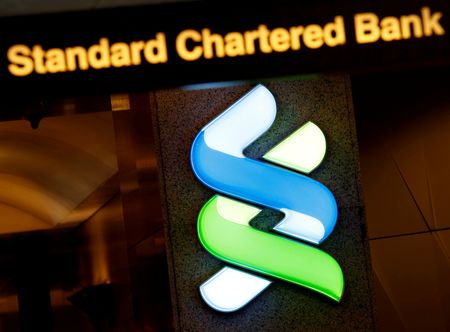
By Anshuman Daga and Lawrence White
SINGAPORE (Reuters) – Standard Chartered posted a forecast-beating 6% rise in first-quarter profit, as the emerging-markets focused lender benefited from rising interest rates as central banks worldwide begin to grapple with inflation.
The lender, which is focussed on Asia, Africa and the Middle East, now expects income growth this year to slightly exceed the previously guided 5-7% range, underlining how banks’ prospects are being lifted by policy rate hikes even as the global economic outlook grows murkier.
While the results indicated how such hikes are benefiting banks such as London-headquartered StanChart, they also showed signs that tougher times may lie ahead as the Ukraine war threatens to puncture a recovery from the COVID-19 pandemic.
Statutory pretax profit for the bank, which earns most of its revenue in Asia, increased to $1.49 billion in January-March, from $1.4 billion a year earlier. This compared with the $1 billion average estimate of 16 analysts as compiled by the bank.
“We are on track to deliver 10% return on tangible equity by 2024, if not earlier,” Group Chief Executive Bill Winters said in the results statement on Thursday.
Winters, who took charge in mid-2015, has tried to restore growth while creating a portfolio of digital assets in the last few years, after repairing the bank’s balance sheet and slashing thousands of jobs in his early years.
But the company’s share price has halved during his time.
The pandemic continued to weigh on the bank’s China business in particular, as closures of its branches amid ongoing restrictions drove an 18% decline in the bank’s wealth management income compared with the same period a year ago.
The results came a day after larger rival HSBC shelved plans for new stock buybacks this year after reporting an unexpected hit to its capital as a cocktail of rising inflation, geopolitical tensions and economic weakness dented its prospects.
StanChart took a $107 million charge due to the ratings downgrade of Sri Lanka, and a further $160 million charge on its exposure’s to China’s troubled real estate sector.
The bank’s trading business reported income up 32%, with its macro trading unit reporting a record quarter as the bank benefited from volatility in energy prices.
StanChart’s London-listed shares have lost 2% over the past year versus a 10.4% rise for HSBC and a 24% decline for Barclays.
(Reporting by Anshuman Daga and Lawrence White; Editing by Kim Coghill)

